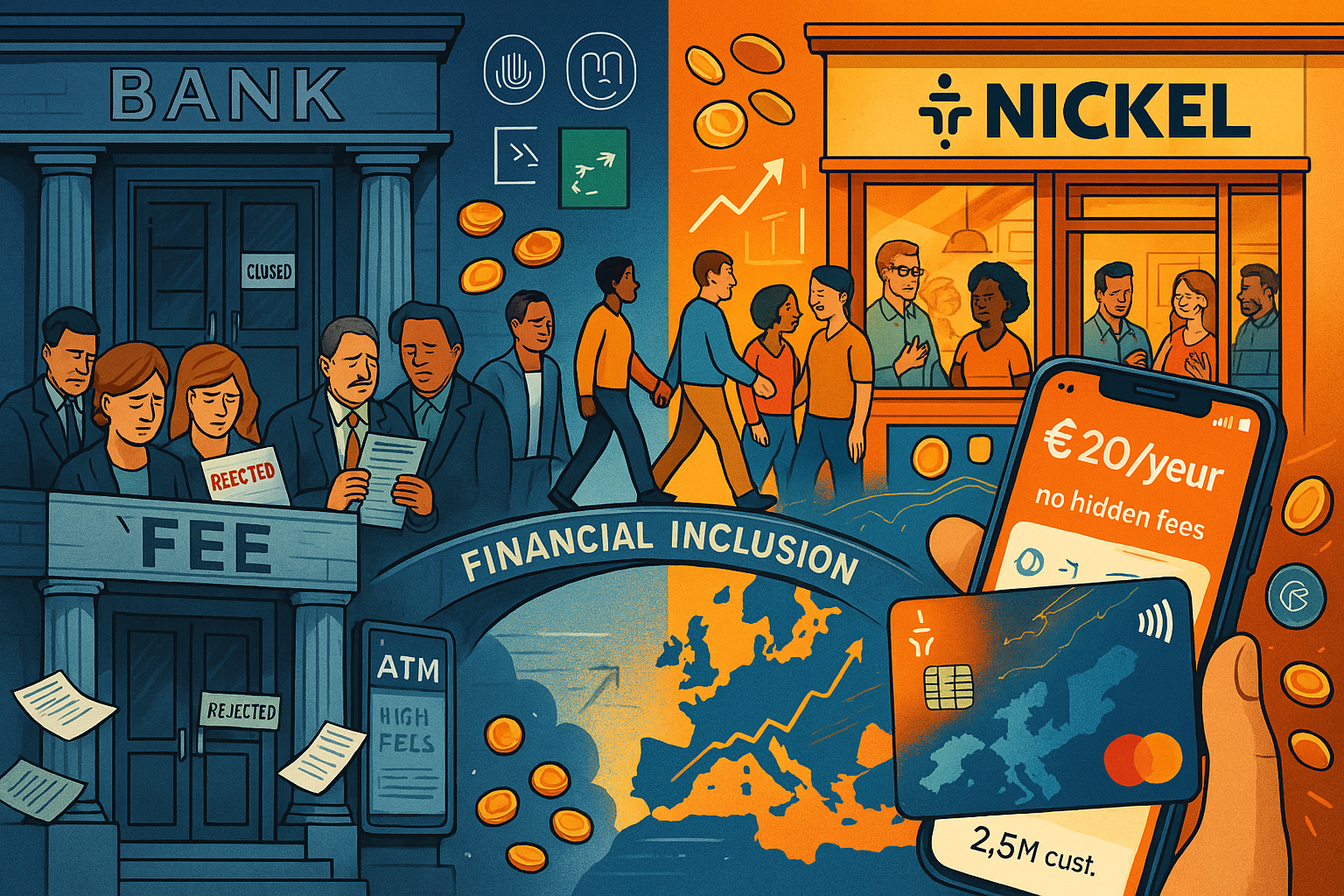Introduction to Nickel’s Banking Revolution
The financial services landscape has undergone a remarkable transformation in recent years, with traditional banking models being challenged by innovative fintech solutions that prioritize accessibility, affordability, and user experience. Among these disruptive forces, Nickel (formerly Compte-Nickel) has emerged as a powerful player in the European market. According to fintechzoom.com nickel analysis, this French banking alternative has been revolutionizing financial inclusion since its inception in 2014, offering services to demographics traditionally underserved by conventional banks.
Nickel’s success story represents a fascinating case study in how technology-driven financial services can democratize banking access while maintaining profitability. This comprehensive examination explores Nickel’s unique business model, its impact on financial inclusion, and the factors behind its rapid growth as covered by industry observers including fintechzoom.com nickel reporting.
The Origin Story and Business Model
From Tobacconist to Banking Powerhouse
Nickel was founded in France with a revolutionary concept: providing basic banking services through a network of tobacconists (tabacs) rather than traditional bank branches. This unconventional approach allowed Nickel to reach customers in areas where bank branches had closed and to serve individuals who might have been rejected by traditional banking systems.
The company’s name itself reflects its value proposition—offering services at a “nickel and dime” price point, making banking affordable for everyone. The initial offering was straightforward: a bank account and a Mastercard payment card available for a small annual fee without any income requirements or overdraft facilities.
The BNP Paribas Acquisition
Nickel’s innovative approach attracted significant attention, culminating in its acquisition by BNP Paribas in 2017 for €200 million. Rather than absorbing Nickel into its existing operations, BNP Paribas has allowed it to operate independently while providing resources for expansion. This strategic decision has enabled Nickel to maintain its distinct identity and continue its mission of financial inclusion while benefiting from the stability and resources of a major banking group.
How Nickel Differentiates in the Digital Banking Space
Inclusive Banking Philosophy
Unlike many neobanks that target tech-savvy millennials, Nickel has positioned itself as a solution for everyone, including those who might be financially vulnerable or excluded from traditional banking systems. This inclusive approach has resonated particularly well in France, where an estimated 1.5 million people had limited or no access to banking services before Nickel’s emergence.
Physical-Digital Hybrid Model
While most digital banks operate exclusively online, Nickel has embraced a hybrid model that combines digital convenience with physical touchpoints. As detailed in fintechzoom.com nickel featured articles, this strategy has proven particularly effective in reaching customers who might not be comfortable with purely digital solutions. The network of tobacconist partners serves as mini-branches where customers can open accounts in minutes with just an ID, a phone number, and a small fee.
Straightforward Pricing and No Credit Checks
Nickel has distinguished itself through transparent pricing and the absence of credit checks. For a fixed annual fee (around €20), customers receive a fully functional current account and a Mastercard. There are no hidden charges, no overdraft facilities, and no possibility of going into debt—features that appeal to budget-conscious consumers and those with problematic credit histories.
Market Impact and Expansion
Rapid Customer Acquisition
Nickel’s growth trajectory has been impressive by any standard. By 2023, it had attracted over 2.5 million customers in France alone. Its customer base has been growing at a rate of approximately 30,000 new accounts per month, demonstrating strong market demand for its services. The simplicity of account opening—taking just minutes rather than days—has been a key driver of this rapid adoption.
European Expansion Strategy
Building on its domestic success, Nickel has been implementing an ambitious European expansion strategy. The company has already established operations in Spain and Belgium, with plans to enter other European markets. This expansion is part of a broader strategy to reach 4 million customers across Europe by 2025.
Impact on Traditional Banking
The success of Nickel has prompted responses from traditional banks, many of which have launched their own digital offerings or simplified their account opening procedures. This competitive pressure has benefited consumers across the banking spectrum, as institutions race to improve their services and reduce barriers to access.
Technological Infrastructure and Innovation
Robust Back-End Systems
Despite its affordable pricing model, Nickel has invested heavily in building robust technological infrastructure. Its systems are designed to handle high transaction volumes while maintaining security and compliance with regulatory requirements. This technological foundation has been crucial in supporting its rapid scale-up without compromising service quality.
Mobile Application Development
Nickel’s mobile application offers essential banking functions in an intuitive interface, making day-to-day banking accessible even to those with limited technological proficiency. Regular updates have added features based on customer feedback, demonstrating the company’s commitment to continuous improvement and user-centered design.
Biometric Security Implementation
To balance accessibility with security, Nickel has implemented advanced biometric authentication features in its digital channels. These include fingerprint recognition and facial identification, providing robust security measures without creating unnecessary friction in the user experience.
Social Impact and Financial Inclusion
Serving the Unbanked and Underbanked
One of Nickel’s most significant contributions has been providing banking services to previously unbanked individuals. This includes people with irregular incomes, the recently bankrupt, and migrants who might struggle to meet traditional banks’ requirements. By offering accounts without minimum income requirements or credit checks, Nickel has created financial opportunities for these vulnerable groups.
Financial Education Initiatives
Beyond providing basic banking services, Nickel has launched various financial education initiatives. These programs aim to improve financial literacy among its customers, helping them manage their finances more effectively and build long-term financial stability.
Economic Revitalization in Rural Areas
The partnership with tobacconists has had positive externalities for local economies, particularly in rural and semi-urban areas. Tobacconists offering Nickel services have reported increased foot traffic and revenue, contributing to the sustainability of these small businesses that often serve as community hubs.
Challenges and Future Prospects
Regulatory Compliance in Multiple Markets
As Nickel expands across Europe, navigating diverse regulatory environments presents a significant challenge. Each country has its own financial regulations, consumer protection laws, and compliance requirements. Managing these varied regulatory frameworks while maintaining operational efficiency requires substantial resources and expertise.
Competition from Traditional Banks and Fintechs
The digital banking space has become increasingly crowded, with competition from both established banks launching digital offerings and new fintech startups. Maintaining differentiation and continuing to attract new customers in this competitive landscape will require ongoing innovation and marketing investment.
Balancing Growth with Service Quality
Rapid expansion can sometimes lead to degradation in service quality. Ensuring that customer service remains responsive and effective while adding thousands of new customers monthly presents an operational challenge that Nickel must address to maintain its reputation and customer satisfaction levels.
Conclusion: The Future of Inclusive Banking
As reported by fintechzoom.com nickel industry analysis, Nickel’s journey from a French startup to a pan-European banking alternative demonstrates the power of innovation to transform financial inclusion. By challenging conventional banking wisdom and focusing on underserved segments, Nickel has not only built a successful business but has also made meaningful social impact.
The company’s hybrid physical-digital model offers valuable lessons for the broader fintech industry, suggesting that pure digital solutions may not always be the most effective approach for achieving true financial inclusion. As Nickel continues its expansion and evolution, it serves as both an inspiration and a case study in how financial services can be reimagined to serve everyone, regardless of their financial status or history.
The banking revolution pioneered by Nickel represents just the beginning of a broader transformation in how financial services are delivered globally. As similar models emerge in other markets, we may be witnessing the early stages of a fundamental shift toward more inclusive, accessible, and human-centered banking experiences worldwide.







